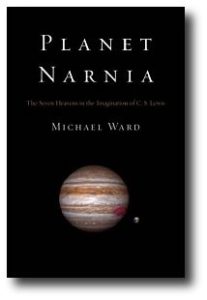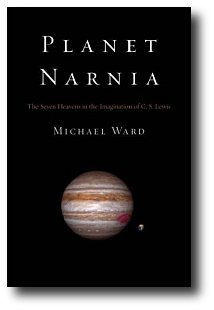The Narnia Secret
If the title Planet Narnia makes you cringe, you’re not alone. And if the title The Narnia Code makes you think “Lewis would have hated this,” well, me too (although upon reflection, I realized it was Tolkien who would have hated it–and he didn’t much care for Narnia anyway).
 Added to the list of things I don’t much care for is literary theory that imposes something on a book that I don’t believe the author meant to put there. But Michael Ward, author of Planet Narnia, insists that he is not imposing a theory on the Narnia books. The subject of his thesis is, he claims, a “discovery”–the uncovering of “a genuine secret”: a thematic unity in the Narnia books that Lewis himself constructed and deliberately hid.
Added to the list of things I don’t much care for is literary theory that imposes something on a book that I don’t believe the author meant to put there. But Michael Ward, author of Planet Narnia, insists that he is not imposing a theory on the Narnia books. The subject of his thesis is, he claims, a “discovery”–the uncovering of “a genuine secret”: a thematic unity in the Narnia books that Lewis himself constructed and deliberately hid.
Skeptical but willing to give the theory an ear–especially since it was mostly presented by British academics, and I can listen to those accents all day long–I settled in to watch the BBC documentary The Narnia Code with family the other night. And . . . it was fascinating. Quite possibly a genuine discovery.
You can watch the trailer here. It is not as intriguing as the actual documentary. And I am very much looking forward to reading the book, which you can learn more about here. Be prepared for a delightful mesh of literature, medieval cosmology, Christian worldview, and, as Michael Ward puts, a deeper understanding of Lewis’s view of a “meaning-drenched universe.”





























Hmm, this sounds possibly good–I am beyond tired of “Lewis was an Evil Xtian who hated women.”
Interestingly, I just got done reading the book. Is it experiencing a second “wave”?
At first I was skeptical also. However, the author identifies with that reaction early, and wins a reader’s trust not only with his careful scholarship and clear Christianity, but with a great little jibe against conspiracy/”secret meaning” obsessions such as silly books like The Da Vinci Code “unintentionally parody.”
However, I enjoyed Planet Narnia, though it was often quite the brain-stretching read!
It was also fascinating to see more of the fact that Lewis wasn’t just using whatever spare parts he could find to service an Allegory. In addition to his naturally occurring Christ-exalting themes, Lewis wanted to echo what he saw as transcendent symbols and ideas from the medieval conception of the seven planets rotating in their spheres.
That doesn’t at all cancel out his Christianity; rather, for Lewis, it enhanced it, and showed that even “pagan” ideas, especially the ones that incidentally approached truth, can be redeemed and placed under Christ’s — or Aslan’s — rule.
And this is despite many scholars — often taking after J.R.R. Tolkien, who was also brilliant but a bit high-falutin’ — saying that Lewis’ works were only a hodgepodge of spare parts. Ward shows how their harmony is greater than often perceived, and in the process explores more of Lewis’s mind, how Christians should perceive pagan notions like mythological personifications of Jupiter and Venus, and how the “pagan” symbols don’t overwhelm or compromise “Narnia’s” Christian themes, but strengthen them.
That does sound interesting. I would be skeptical, too. Probably would have bypassed it until I heard more about it from others. I’ll have to keep this one on my ‘to read’ list.
I now want to read this book. I had always wondered as a kid why Lewis chose to include Bacchus in Prince Caspian (and was thoroughly disappointed when the recent movies left it out, by the way), among other things.
Greg, if you’re still wondering, I did too — especially because I never understood the point of having all those nonsense-seeming scenes while there were more exciting things going on, such as a war. Then I heard that this was another way Lewis wanted to show, more overtly, the subjugation of pagan myths and creatures to Aslan. I think that in people’s rightful crediting of Lewis as a strong Christian, we forget how much he really enjoyed the pagan myths he studied for years. This was his reminder, to others and perhaps to himself: even if such creatures were real, somewhere, they all serve the true king: the Lion.
Interesting stuff, Rachel. I want to see the documentary!
Becky
I’m …cautious, to say the least. There is only so much to be said that hasn’t been said before. On the other hand, I’m a diehard Lewis fan, so I might investigate it later.
I’ve read Planet Narnia and found the book to be a compelling and thought-provoking, if difficult, read. I made the mistake of watching The Narnia Code documentary after having read the book. I found the documentary light and insubstantial (but honestly, anything based on the book would pale in comparison to that complex academic tome). The book was far superior but the documentary is probably a good starting point for interested people.
Those of you who have read it: thanks for your brief reviews. It keeps rising higher in my “want to read” list, not least because of its purported “brain-stretching” abilities! Yes!
For those still skeptical, check it out. The documentary all by itself, light and insubstantial though it is, has pretty much convinced me that Ward is right. And this doesn’t feel at all like something tacked on to Narnia: it’s something that actually makes sense, as Stephen said, of the “hodge-podge.”
I kept thinking that Lewis was probably laughing up his sleeve at Tolkien and the other critics.